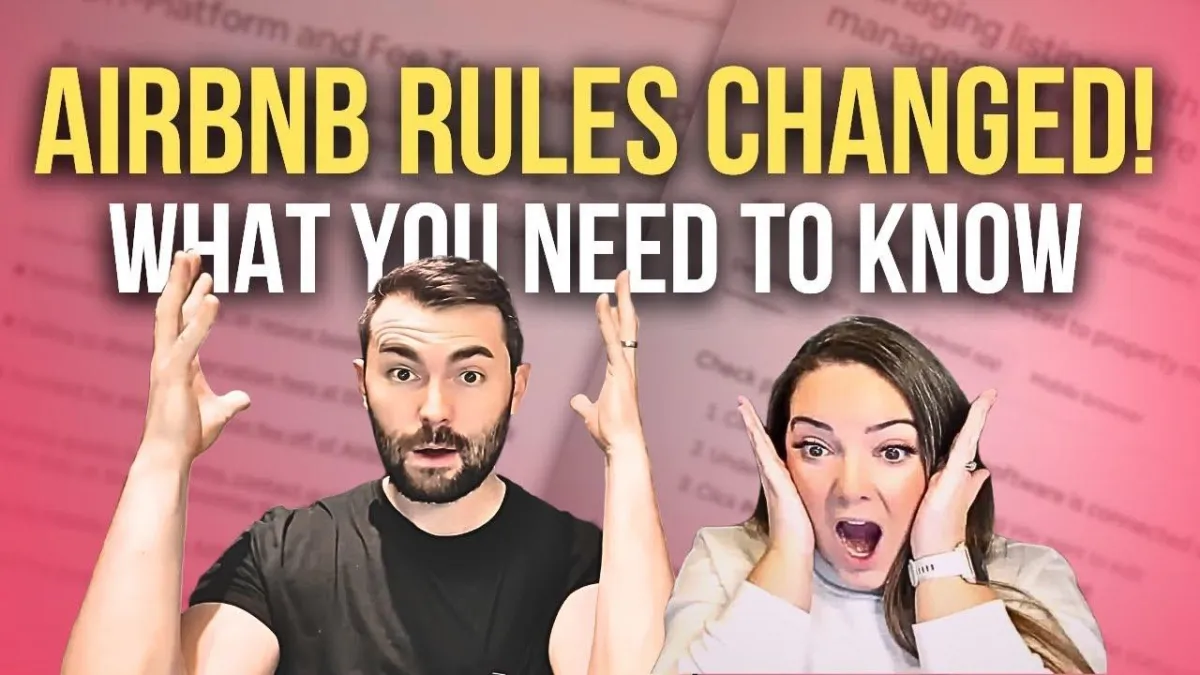
Airbnb Just Changed the Rules Again - What It Means for Your Hosting Business
Airbnb Just Changed the Rules Again - What It Means for Your Hosting Business
April 2025 has brought a seismic shift to the Airbnb hosting community. With a sweeping update to its policies, Airbnb is tightening its grip on how hosts interact with guests—on and off the platform. This move has triggered panic across the short-term rental world, but it doesn’t mean your hosting business is doomed. In this post, we’ll break down:
What the new Airbnb policy update is all about
Why hosts are so upset
And most importantly, what you can do to protect and grow your business
Whether you're a full-time STR professional or a casual host, understanding these changes is crucial to staying compliant and competitive.
The Update That Shook the Hosting World
On April 11, 2025, Airbnb released a major update to its Offsite Payment and Fee Policy. According to Katrina and Michael—co-founders of STR Wealth Academy with 73 active listings and over 400 trained students—this update is nothing short of a bombshell.
The new policy aims to clamp down on hosts rerouting Airbnb guests for direct bookings, thereby cutting Airbnb out of future revenue. Understandably, this move is stirring up backlash within the hosting community.
Airbnb's 6 Major Policy Changes – Explained
Let’s walk through the six core areas of the update, what they really mean, and how they impact your business.
No More Off-Platform Repeat or Future Bookings
Airbnb is now strictly forbidding hosts from:
Encouraging current guests to extend their stay outside of Airbnb
Suggesting repeat bookings directly or through another platform
Using guest contact information for future marketing
Penalty: Listing suspension or permanent ban
Why it matters: This directly targets the growing trend of hosts converting Airbnb guests into direct-booking clients—a common strategy to reduce fees and build brand loyalty.
All Fees Must Be Disclosed Upfront
From pet fees to early check-ins, every single charge must now be baked into your nightly rate or listed explicitly on Airbnb.
No more collecting fees post-booking (unless you're using approved API-connected software)
This includes security deposits, cleaning fees, and even grocery delivery add-ons
Example Impact: One host reported earning over $60,000 from pet fees alone last year—much of which may now be restricted under this policy.
Security Deposits: Major Restrictions
Airbnb is now banning undisclosed security deposits, and you can't request one post-booking unless you use an API-connected platform.
The resolution center can no longer be used for this
Most individual hosts (with 1–2 listings) don’t use API-connected software, so they’re particularly affected
Workaround: Use a channel manager or PMS (Property Management System) that is API-integrated with Airbnb to disclose deposits pre-booking.
No Off-Platform Communication or Identity Collection
Airbnb wants all communication and guest data confined to their platform:
No asking for contact info before booking
No using apps (like Autohost or SE Sonder) that collect ID or email info
No sending check-in instructions via email, text, or third-party apps
Airbnb specifically bans directing guests to download third-party apps—even for check-in instructions or house manuals.
Feedback & Reviews Must Stay On Airbnb
Hosts can no longer encourage guests to leave reviews on:
Google
Facebook
Yelp
Or any external platform
This is a blow to hosts who built SEO authority and social proof via third-party reviews.
Real-world impact: One host reported over 500 Google reviews that drove their property management business—now they'll need a new strategy.
No Off-Platform Tools to Access the Property
You’re now forbidden from:
Requiring guests to access third-party apps for check-in
Using digital house manuals hosted outside Airbnb
Offering pre-arrival forms or waivers through external tools
Tools affected: Safely, Autohost, Truvy, and others in the verification and deposit space are now operating in a legal gray zone.
Why Is Airbnb Doing This?
The motivation is clear: Airbnb wants to protect its customer base and revenue.
They spend millions on marketing and don't want hosts sidestepping the platform to secure future bookings. This is their way of building a bigger moat around their business model.
But the broad language used in this policy leaves a lot of room for interpretation and future iterations. In the past, Airbnb has responded to backlash by revising its policies, and we expect the same this time.
What Hosts Can Do Now
If you're worried about these changes, don’t panic—pivot. Here's what Katrina and Michael recommend:
Use API-Connected Software
This allows for pre-booking disclosures (security deposits, fees, etc.).
Tools like Guesty, Hostfully, or Hospitable can integrate directly with Airbnb.Disclose Everything Upfront
Include all fees and expectations directly in your Airbnb listing.
Use the “Other things to note” section to your advantage.Go Multi-Platform
Don’t rely solely on Airbnb.
Get listed on Booking.com, Vrbo, Google Travel, Houfy, and build your own direct booking site.
If you're 100% reliant on Airbnb, you're exposing your business to significant platform risk.
Monitor Updates Closely
This policy is set to fully roll out May 10–11, 2025.
Airbnb is actively soliciting feedback—make your voice heard.
Final Thoughts: A Call to Professionalization
This policy shift is a wake-up call. If you're serious about short-term rentals, treat it like a business. That means:
Investing in proper tools
Protecting your properties legally and financially
Diversifying your income streams beyond one platform
Airbnb is tightening the rules, but smart hosts will adapt, evolve, and thrive.
Stay flexible. Stay informed. And start building an STR business that can weather the storms.
Got Questions?
Reach out on STR Wealth Academy channels or drop a comment below. We’re here to help you navigate the chaos and come out stronger.
Happy Hosting! 🎉
